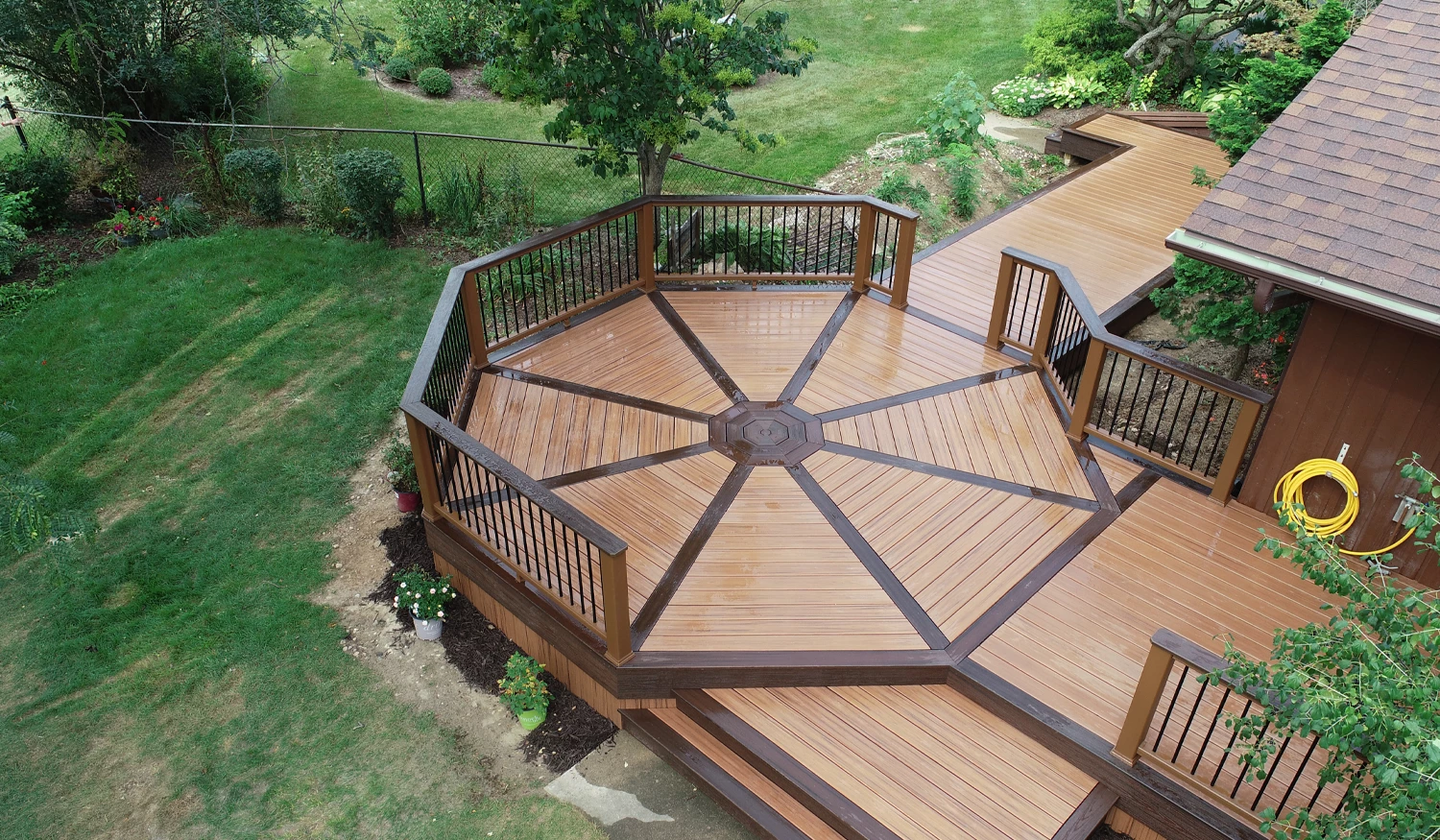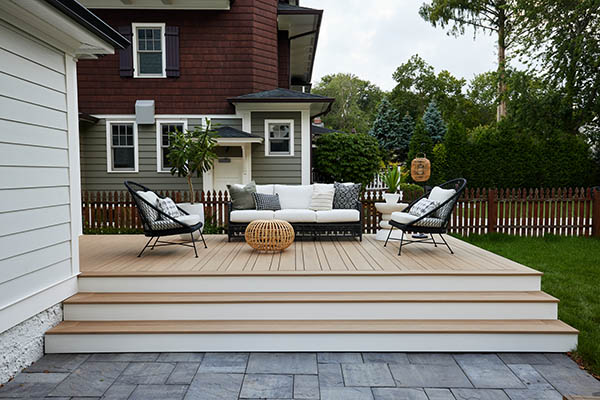Finding the best providers for deck installation near me can save you time and money in the long run.
Finding the best providers for deck installation near me can save you time and money in the long run.
Blog Article
How to Choose the Right Materials for Your Deck Installation Job
Picking the ideal products for your deck setup job can appear overwhelming. There are many variables to consider, from sturdiness and maintenance to appearances and ecological influence. The option between conventional wood and composite products, each with its own set of advantages and drawbacks, can be especially challenging. The secret is to balance your budget, style choices, and way of living requires to create a deck that will certainly boost your exterior area for many years to find.
Comprehending the Various Kinds Of Deck Materials
When starting a deck setup project, the selection of products ends up being a critical choice. Different options are readily available, each with distinct qualities and visual charm. Conventional timber, as an example, supplies an ageless, all-natural look and is typically extra cost-effective. Nonetheless, it can warp gradually and requires normal upkeep. Compound materials, on the various other hand, are a mix of wood and plastic, giving toughness and resistance to weather elements. They demand less upkeep compared to wood yet are typically extra pricey. One more choice is plastic, which is practically maintenance-free and immune to parasites and rot, albeit less natural-looking. By understanding these differences, home owners can make a more educated decision on one of the most ideal deck material for their particular requirements.
Examining the Durability and Maintenance Requirements of Deck Materials
Examining the toughness and upkeep requirements of deck materials is a vital action in deck setup. Sturdiness includes the material's capacity to stand up to severe climate condition, wear and tear, and its long life. For instance, cedar and redwood are naturally immune to rot and pests, making them sturdy selections. On the other hand, pressure-treated timber, while long lasting, might call for more upkeep because of its susceptibility to fracturing and deforming.
Recognizing upkeep requirements is just as essential. Some materials require normal sealing or discoloring to maintain their look and withstand dampness damage, while others, like composite outdoor decking, demand much less upkeep. By reviewing these aspects, one can pick the most appropriate outdoor decking material, guaranteeing a balance in between resilience, maintenance needs, and aesthetic charm.
Price Analysis: Comparing Wood and Compound Decking
Although expense might initially appear like an additional issue, it is a substantial factor when comparing wood and composite decking. Timber, generally a more economical alternative, has a reduced ahead of time cost. Over time, maintenance expenditures can gather, potentially making timber much more expensive in the lengthy run. These upkeep expenses might consist of discoloration, securing, or replacing damaged boards. On the various other hand, composite decking, while pricier at first, requires less maintenance, possibly reducing long-term expenses. Yet, it's crucial to bear in mind that composite decking isn't invulnerable to damage, and substitute expenses can be high. As a result, possible deck proprietors have to consider their budget plan and determination to maintain their decks when determining between timber and composite decking.
Aesthetic Appeals and Layout Adaptability of Decking Materials
While expense is a crucial consideration, the aesthetic appeal and style adaptability of outdoor decking materials additionally play a significant role in the decision-making process. Different materials provide differing degrees of visual charm. All-natural timber decking gives a classic, classic look, while composite products use a large variety of colors and appearances to fit diverse preferences and styles. Design adaptability refers to the capacity to shape and control the decking material to meet details design requirements. Timber, for example, provides high style versatility because of its simplicity of reducing and forming. Compound products, while much less flexible in design, are still versatile enough for most deck styles. These variables, therefore, are essential components in the option of decking material.
Ecological Effect of Decking Products
When selecting outdoor decking materials, one have to think about not only aesthetics and longevity, however additionally the environmental influence. It is essential to analyze the sustainability of materials and explore recycled outdoor decking options. Additionally, comprehending the potential impact on local communities will make certain an extra eco accountable option.
Examining Material Sustainability
In the realm of deck construction, assessing product sustainability is an important action. This involves reviewing the environmental effect of each possible product, considering elements such as the power required for its production, its carbon footprint, and its end-of-life disposal or recycling alternatives. Timber is a renewable source, however unsustainable logging practices can lead to deforestation. Composite outdoor decking products often incorporate timber and plastic, reducing the demand for new hardwood but increasing dependence on fossil fuels. Aluminum and other metals may be much more sturdy and recyclable, however their removal and handling can be energy-intensive. Therefore, the choice of outdoor decking products should stabilize performance, aesthetics, expense, and sustainability to guarantee a liable and durable setup.
Recycled Outdoor Decking Options

Composite decking is particularly preferred due to its longevity and simplicity of upkeep. Recycled plastic outdoor decking, on the other hand, is very resilient and requires marginal upkeep.

Influence on Local Ecosystems
While the advantages of making use of recycled products for decking can not be overstated, it's equally vital to think see this page about the more comprehensive ecological implications of these options. Correct disposal of old decking is crucial to minimizing land fill waste. Essentially, an eco-conscious deck job demands cautious product option, sustainable sourcing, and liable disposal.
Making Your Last Decision: Tips for Choosing the very best Deck Materials
As the article transitions into the subtopic of "Making Your Final Decision: Tips for Choosing the very best Deck Materials", it is important to understand the range of deck products available. Striking a balance between resilience and visual appeal is crucial in this option procedure. The following conversation will lead viewers in making an enlightened selection based upon these vital factors to consider.
Understanding Different Deck Products
The task of choosing the best materials for your deck setup can seem daunting due to the large range of choices additional info offered. Vinyl or PVC decks are even more sturdy and call for much less maintenance than composite materials, however they can look much less all-natural. Light weight aluminum decks are strong, light-weight, and resistant to rot, but they are also the most expensive option.
Toughness vs. Aesthetic Appeals Balance
Balancing resilience with visual appeals can be an obstacle when picking deck products. The decision frequently boils down to individual choices and the deck's meant usage. High-traffic locations may demand sturdy products like composite decking, which withstands damage but may do not have the natural appeal of timber. On the other hand, timber uses an ageless appeal and heat that synthetic products struggle to replicate. It requires extra maintenance and may not last as long. For that reason, house owners need to strike an equilibrium, considering both the deck's sensible demands and their visual preferences. By doing so, they can ensure their deck remains a practical and attractive outside room for several years ahead.
Conclusion
In conclusion, choosing the best materials for your deck setup project requires careful factor to consider of elements such as sturdiness, upkeep, expense, appearances, and ecological effect. Whether you choose for standard wood or composite products, your selection needs to line up with your budget plan, design choices, and way of living. Eventually, the best decking material is one that boosts your outside space and provides enjoyment for several Visit Your URL years to find.
Report this page